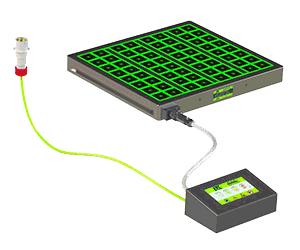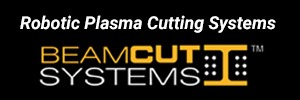Cutting With A Purpose
Founded in 1896, Bico Steel prides itself on being a value-add supplier of steel plate and forged steel blocks. Switching bandsaw blades helped the Michigan company prove its worth when asked to quickly deliver product for ventilators early in the pandemic.
Posted: August 26, 2020
BY CHRIS MARTENSEN
As the COVID-19 pandemic disrupted the American economy earlier this year, thousands of companies stepped up to make a positive difference. With an assist from bimetal bandsaw blades, Bico Steel of Grand Rapids, Mich., was one of those companies.
Bico Steel is a steel plate and forged steel block supplier and processor specializing in precision burning, sawing, grinding, heat treating, and machining. The company, which traces its roots back to 1896, bills itself as a steel service center that brings value-add to its customers.
At 10:30 p.m. on Fri., March 20, Vice President and General Manager Seth Galentine got a call from a long-time local customer with a special request. Die-Tech & Engineering, a plastic injection mold and die-cast dies shop in Wyoming, Mich., was partnering with another casting company to supply parts to manufacture ventilators and needed steel cut to specific dimensions ASAP.
Two Bico employees nearing the end of their shift volunteered to stay later to start the project. Galentine also stayed late to help and delivered the first blocks at 2 a.m. Other employees volunteered to work on Saturday to finish the order.
“We were very happy to help in this effort,” Galentine says. “This project is a great demonstration of manufacturers coming together and collaborating to bring solutions to help people in need.”
Bico used the 3851 Sandflex Cobra bimetal bandsaw blade from Bahco International, a Snap-On Industrial Brand, to saw the steel blocks to size. Bico switched to Bahco last fall after completing a month-long test of its blades.
The Cobra is designed for jobs like Die-Tech. It has a powdered-metal M42 high-speed-steel tooth edge for higher hardness, which produces smooth, precise cuts. The blade is engineered for contour cutting of materials including aluminum and stainless steel. Twenty-nine versions are available, ranging in widths between 34 mm and 80 mm and blade thicknesses between 1.1 mm and 1.6 mm.
While the majority of the steel market in the United States is sheet and coil, Bico has carved out a niche by working exclusively in heavy plate steel of thicknesses ranging from 1 inch to 50 inches.
“We’re pretty niche and never tried to swallow the world,” Galentine says. “We focus on what we’re good at. We take care of our customers extremely well and we tend to stay in our lane, and that’s heavy plate.”
Cutting such thicknesses can take a toll on bandsaw blades. Although Galentine was satisfied with the blades Bico was using, he was open to evaluating options. After meeting Bahco Technical Specialist Mark Fralick, they set up a test to evaluate the blade’s performance.
“The testing parameters were that the blades had to average 8-1/2 square inches of feed per minute; slowing it down to hit the blade life is not acceptable. You’ve got to be able to push product through the saw, so 8-1/2 square inches was the minimum,” Galentine says. “And 13,000 square inches on the life of a blade was considered a success. Bahco met the performance requirements to establish themselves as the primary supplier.”
In addition to performance, Galentine factored in customer service, availability of inventory, and price into his decision.
“Bahco checked more boxes than the blade I was using,” he says. “It’s a better blade, the service is much better, and the price is in line; but Mark’s level of commitment really tipped the scales. They’ve serviced us well this past year, so it was a good choice to go with them.”
“Bico Steel had some pretty strict guidelines, but we were able to improve their production,” Fralick says.
New Advances In Blade Technology
In most steel service center saw rooms, blade life and speed of cut take priority over other performance criteria such as surface finish. But just as a car’s gas mileage goes down the faster you drive, blade life and speed of cut also have an inverse relationship.
One of the more recent improvements in blade design is the wavy bandsaw blade (WBB). By milling a series of gradual slopes, or waves, into the blade’s back edge, manufacturers have been able to increase blade performance. WBBs increase tooth penetration by exerting more force with the same amount of feed pressure. The biggest benefits can be seen when cutting larger-diameter materials. Because the design also reduces the amount of friction generated, the blades are ideal for aerospace alloys and other alloys that harden with rubbing.
A wavy-back edge can be applied to both bimetal and carbide-tipped blades. What’s the difference? Bimetal blades have a tooth tip hardness of 67 Rc to 69 Rc; carbide blades, 90 Rc or more.
If carbide blades cut faster and last longer, shouldn’t everyone use them? Not necessarily. Determining which type is right for your operation depends on factors such as the saw’s rigidity and material type and condition. Also, a carbide-tipped blade can cost up to three times more than a bimetal blade.
A New Take On Roughing
Once the steel is cut with a bandsaw, it needs to be roughed. One of the value-adds Bico Steel offers customers is rough machining. Galentine says a trend he’s seeing in the industry are customers outsourcing roughing to steel service centers due to the poor return on investment to complete the process.
For example, manufacturing injection molds, stamping dies, or other critical parts involves skilled workers operating high-tech milling machines – which generates revenue. Roughing steel, on the other hand, does not.
This is where Bico saves customers time and money. Bico makes the customer more efficient by eliminating the roughing operation.
“Taking on this responsibility allows our customers to go right into the high-value machining,” he says. “They can do more molds in a year and use their floor space more efficiently to generate more revenue.”

















